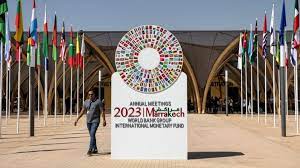By Haruna Gimba
The G20 finance ministers are meeting in Marrakesh, Morocco on global economic growth, debt, inflation, expanding development bank aid, the pandemic and other crises.
A religious development group, Jubilee USA Network, said at the Annual International Monetary Fund (IMF) and World Bank meetings, the ministers reached agreement on a communique, which the ministers had failed to do since the beginning of the Ukraine war in February 2022.
“The ministers met as a gap grows between the poor and the wealthy and as some countries see modest growth and poor countries are worse off,” Mr Eric LeCompte, Executive Director of the Jubilee USA Network said.
“The G20 made important commitments to boost the lending and aid capacity of the World Bank and other development banks to support developing countries.”
Officials welcomed an experts group report they commissioned earlier this year to examine the additional capacity multilateral development banks need.
The group’s chairs are former US Secretary of Treasury Larry Summers and former chairperson of the Fifteenth Finance Commission of India Nand Kishore Singh.
It estimates development banks together should ramp up finance and aid by $260 billion annually, as part of an annual $1 trillion external flows to finance climate and development in emerging and developing economies.
“The G20 needs to increase the resources for development banks so countries can emerge from crises and reach their development and climate goals,” noted LeCompte.
“What they agreed on only increases annual development bank funding by one-twentieth of what experts say is needed.”
Inflation is easing in several countries but risks remain and core inflation is persistent, the G20 said.
“We need to stop raising interest rates. This flawed policy, to stop inflation, hurts all of us,” shared LeCompte. “Raising interest rates spurs more debt crises in developing countries and makes food and fuel too expensive for us.”
While the World Bank called for the Israel and Gaza conflict to deescalate, the document makes no mention of the events or its impacts on global economic activity.
“It appears the cost of reaching consensus language was to dodge the Israel and Gaza question altogether,” said LeCompte. “Beyond the tragic loss of life, global financial stability and the poor around the world will be dramatically affected.”


